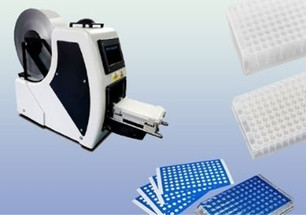Posted by Chrom Tech on 17th Nov 2025
Which 96-Well Plate Should I Use for LCMS?
Choosing the right 96-well plate for LCMS applications depends on several critical factors: rim design, sample recovery needs, and potential for analyte binding to the plate material. Selecting the right plate can dramatically improve assay reproducibility, recovery, and throughput efficiency in LCMS workflows.
Rimmed vs. Non-Rimmed Polypropylene 96-Well Plates
Rimmed polypropylene plates are designed to prevent cross-contamination and ensure secure seals during processing. When paired with a thermal plate sealer, rimmed plates are ideal for high-throughput workflows that require durable heat seals. Thermal sealers are compatible with a variety of heat seal films and foils, offering both peelable and permanent seals for materials such as polypropylene, polystyrene, and polyethylene.
Non-rimmed plates, on the other hand, are best suited for use with adhesive sealing films. For LCMS workflows, Chrom Tech recommends our BST-9790 PTFE sealing film, which features an adhesive-free zone around each well. This unique design keeps pipette tips and metal probes clean, minimizing contamination and ensuring precise liquid handling for reliable automation.
Maximizing Sample Recovery
When sample recovery is a concern—particularly for low-volume or precious samples—Chrom Tech offers 1 mL 96-well plates with 50 µL tapered reservoirs. The tapered design allows users to recover nearly all of the sample volume, even from the last few microliters at the bottom of each well. This makes these plates ideal for expensive standards or limited biological samples where every microliter counts.
Preventing Sample Binding to Plastic
Many laboratories transitioning to LCMS platforms encounter challenges with sample adsorption to plastic surfaces—especially when working with hydrophobic peptides or small-molecule compounds. Polypropylene plates, while cost-effective and chemically resistant, can sometimes cause non-specific binding that leads to signal loss or inconsistent quantification.
To eliminate these issues, Chrom Tech offers both glass microplates and 96-well plates with glass inserts. These hybrid systems combine the precision of glass with the automation compatibility of polypropylene plates. Glass minimizes sample binding, improves reproducibility, and provides superior heat transfer for temperature-dependent assays.
In fact, our Multi-Tier Glass Insert Plate System was recently featured in a peer-reviewed high-throughput FAMEs analysis via GCMS, highlighting its versatility across LCMS and GCMS workflows.
Summary
When selecting a 96-well plate for LCMS, consider the type of seal required, the importance of complete sample recovery, and whether your samples might bind to plastic. Rimmed plates are ideal for heat sealing and contamination prevention, while non-rimmed plates pair best with adhesive seals. For critical assays requiring maximum recovery and minimal binding, glass or glass-insert plates are the preferred solution.
For assistance in selecting the best 96-well plate for your LCMS workflow, contact Chrom Tech’s technical team. We’ll help match the right microplate solution to your application and instrumentation.
Looking for More 96-Well Plate Options?
View the complete lineup of polypropylene, deep-well, glass-insert, and specialty plate formats.
Explore All 96-Well PlatesFrequently Asked Questions About LCMS 96-Well Plates
Should I use a rimmed or non-rimmed 96-well plate for LCMS?
Rimmed plates are ideal when using heat sealers to prevent evaporation and cross-contamination. Non-rimmed plates are better suited for adhesive seals and automated workflows where easy sealing and access are required.
How can I maximize sample recovery from my 96-well plate?
Choose a plate with a tapered well design, such as Chrom Tech’s 1 mL square-well plates with a 50 µL tapered reservoir. These allow nearly complete recovery of small sample volumes.
What should I do if my samples bind to polypropylene plates?
Switch to glass microplates or glass-insert plates to reduce hydrophobic binding and ensure consistent quantitation, especially for peptides or small molecules prone to adsorption.

